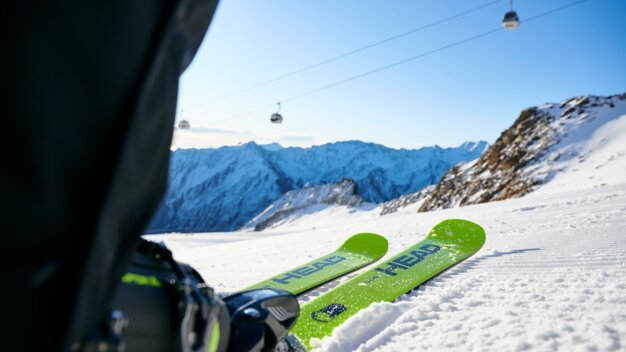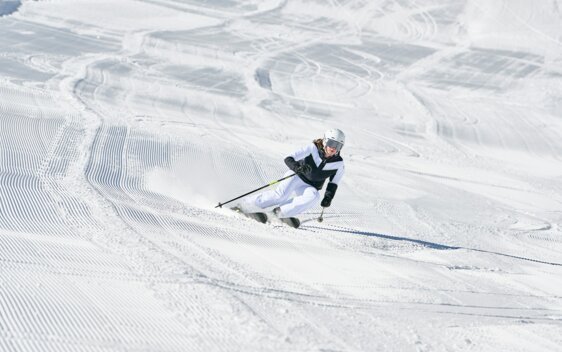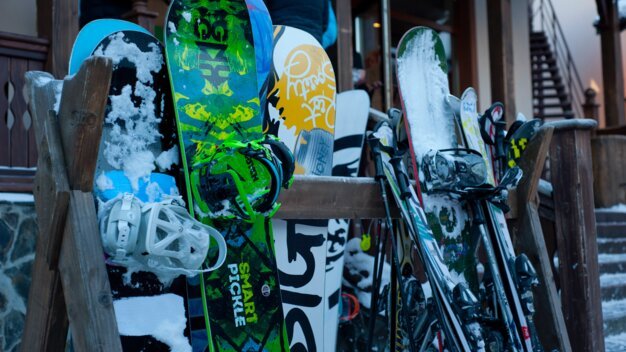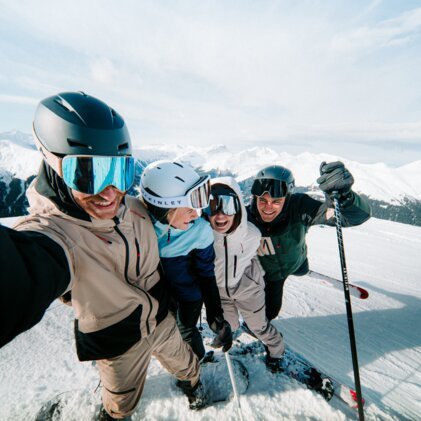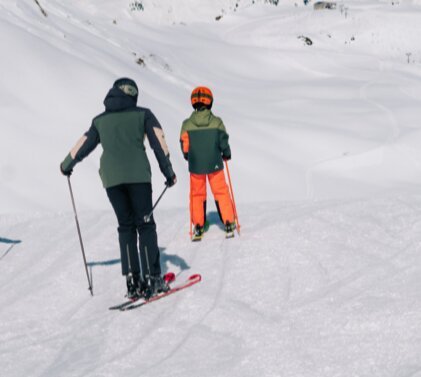
For many winter sports fans, a ski holiday is the highlight of the year – even though transporting all your gear can be quite the challenge. The most important commandment when it comes to ski luggage? Thou shalt store your equipment safely! This applies to transport by car as well as by plane, bus, or train.
Tips for car, plane, bus and train
How do you secure your skis properly in the car? Is a ski bag or a roof box the better option? What needs to be considered when transporting skis by different means of transport? How do I pack my winter sports equipment correctly? We have collected the answers to these questions and summarised the most important tips for you.
In the car
Going on ski holiday by car is often the more comfortable and convenient option. However, you also need to be prepared to drive on wet, slushy or even icy roads. Stepping on the brakes at low speeds can be enough to send your unsecured luggage flying.
Road users are responsible for securing loads – if they fail to do so, heavy fines can be expected. What’s worse, you might endanger other road users as a result. You can avoid this by safely stowing your ski equipment in or on the car. Everything must be fastened in such a way that it does not slide around inside the car or fall off the vehicle when driving or braking.
How to stow your ski equipment safely in or on the car
Rule number one: Objects lying around unsecured are a no-no, especially on the back seat and on the rear shelf. Instead, we recommend storing your ski equipment as follows:
- bulky items such as skis and snowboards: in the roof box or on the roof rack, or in a ski bag or ski sack
- ski boots: in the boot or footwell of your car
- large and heavy objects: as far down in the car as possible, secured with lashing straps or bungee cords
- items on the back seat: secure with seat belts
In addition to special lashing straps, other aids can help you to load your car correctly. For example:
- safety nets between the boot and the driver's compartment
- non-slip mats in the footwell or boot (so that stored items do not slide around as easily)
- blankets to cover light luggage
Important: The car must be loaded in such a way that the mirror, signal, shoulder check is still possible and the view through the rear- and side-view mirrors as well as side windows is unobstructed. If you are transporting heavier loads, it is advisable to adjust the tyre pressure as well as the settings of the headlights to the altered vehicle height.
Ski bag vs. roof box
Ideally, you should store your skis or snowboard on the roof of your car. Special care should be taken when transporting them on the inside. Here’s a quick comparison of the options:
- ski bag: must be well lashed down
- ski sack: robust bag built into the middle seat and extending from the boot into the driver's compartment
Roof boxes and roof racks
If you transport skis and snowboards on the roof, you have more free space inside the car. You can choose between:
- roof box: To ensure that nothing slides around, you can secure the equipment with straps and also stuff blankets into the empty spaces.
- roof rack: less bulky than roof boxes, but your equipment is unprotected from wind and moisture
4 tips for transporting skis on the roof
- When buying a roof box, make sure it is compatible with your car.
- Do not exceed the maximum permissible vehicle load and roof load of the car (Check the manual!).
- Be aware that the roof load shifts the car's centre of gravity and adjust your driving accordingly.
- Keep to the maximum dimensions for passenger cars stated in the road traffic regulations (width = 2.55 m, height = 4 m, excess length at the rear: + 1.5 m)!
How to pack your ski bag
Your equipment is dry and clean? Then you can start packing! It doesn't matter whether you're travelling by car or plane: To ensure that you can transport your ski bag and equipment as easily as possible, it’s important how you pack them.
First, place your skis or snowboard on the bottom of the bag. Then put your ski boots or snowboard boots inside the bag, facing each other. You can store your ski socks in them to save space.
Your helmet goes on top. You can put your ski goggles inside the helmet and your gloves on top of them so that the goggles are nicely padded. You can fill the empty spaces with more ski clothing. Put your ski poles on top – and you're done!
On the plane
Do you only have a few days off, and your ski resort of choice is too far away to take the car? Or do you want to travel overseas to go skiing and snowboarding? Then the plane is the right means of transport for you and your equipment.
You can find out about the respective baggage rules such as maximum weight and dimensions as well as charges directly from your airline. As a rule of thumb, sports equipment is treated as oversized or bulky baggage. Permitted are usually:
- 1 pair of skis or a snowboard
- 1 pair of ski boots or snowboard boots
- 1 pair of ski poles
It’s best to take your equipment in a padded ski bag. You’ve already learned how to pack it in the previous section. Bulky baggage surcharges usually range from zero to 200 euros, so it's worth comparing airlines.
Good to know: Ideally, you should make a reservation for your bulky baggage when you book your flight. If you just show up with it at the check-in counter, additional charges may apply, and airlines can refuse to transport it on the grounds of lack of space.
Usually, you will receive the labels for your ski bag at check-in, which you then drop off at an extra counter for bulky luggage.
On the bus
On package holidays by bus, ski transport is usually included. The skis and snowboards are often stored in a special compartment in the back of the bus.
For independent trips to the ski resort, your winter sports equipment must be registered as bulky baggage. The earlier you do this, the better. If you book too late, there may not be enough room for your gear. You can find out about the transport conditions and charges from the respective bus company. A ski bag is usually the best choice for safe transport.
By train
If you are travelling by train, we recommend that you reserve a seat. Otherwise, if the train is full, you may be refused to board it. Ideally, you should sit near a storage rack so that you can keep an eye on your equipment. Another spacious option: special compartments for cyclists. Some trains even have over-seat luggage compartments, and you can store your skis or snowboard right above your seat.
Tip: Make sure that you store your equipment in a space-saving way and that you don't inconvenience or endanger other passengers!
Lugging your gear around could be a thing of the past! Most railway companies now offer baggage transport. They collect your equipment from your home and take it directly to the destination address. A very convenient, but rather expensive service. You can also find out about special ski holiday offers from the respective railway company.
When is it worth renting your equipment at the ski resort?
What if you could just leave your equipment at home? Give it a try! INTERSPORT Rent has got you covered. We are there for you in the most beautiful ski resorts in the world – with competent winter sports experts, high-quality equipment, first-class service, and attractive prices.
Ski rental is especially worthwhile ...
- ... if you only go on a ski holiday once a year.
- ... if you only ski a few days per year.
- ... if you go on a ski holiday with your whole family.
- ... if you want to try out the latest equipment.
- ... if you can't or don’t want to buy your children new skis every year.
Should you buy or rent winter sports equipment? We’ll help you decide. Learn more about the advantages of both options and find out when it pays to buy your own gear!
INTERSPORT Rent tip
"I packed my bag and in it I put ...": The well-known children's game can quickly become a nightmare once you’re an adult. Have you lost track of what to pack and want to make sure you didn't forget anything? Help is on the way: Here's the ultimate packing list for your ski holiday!

